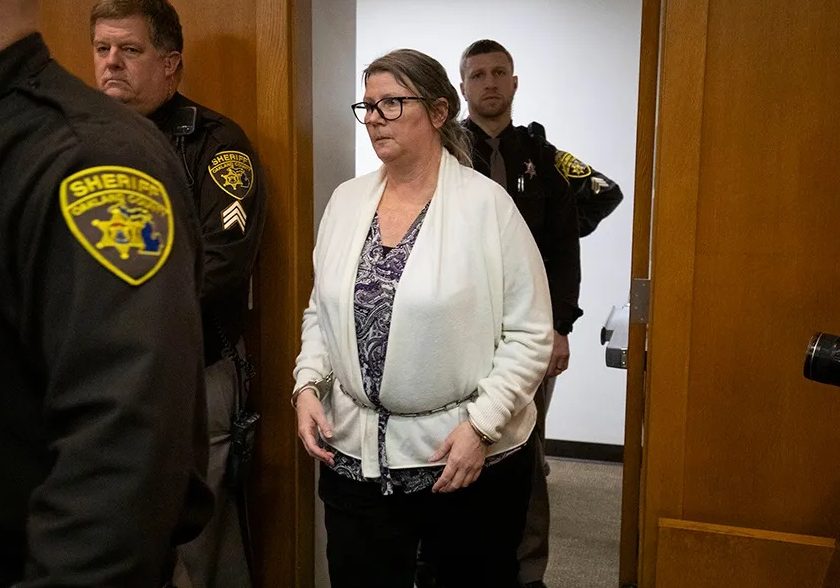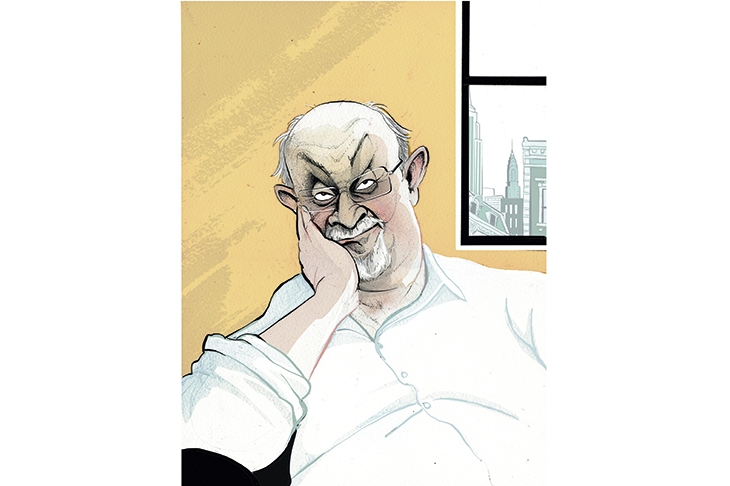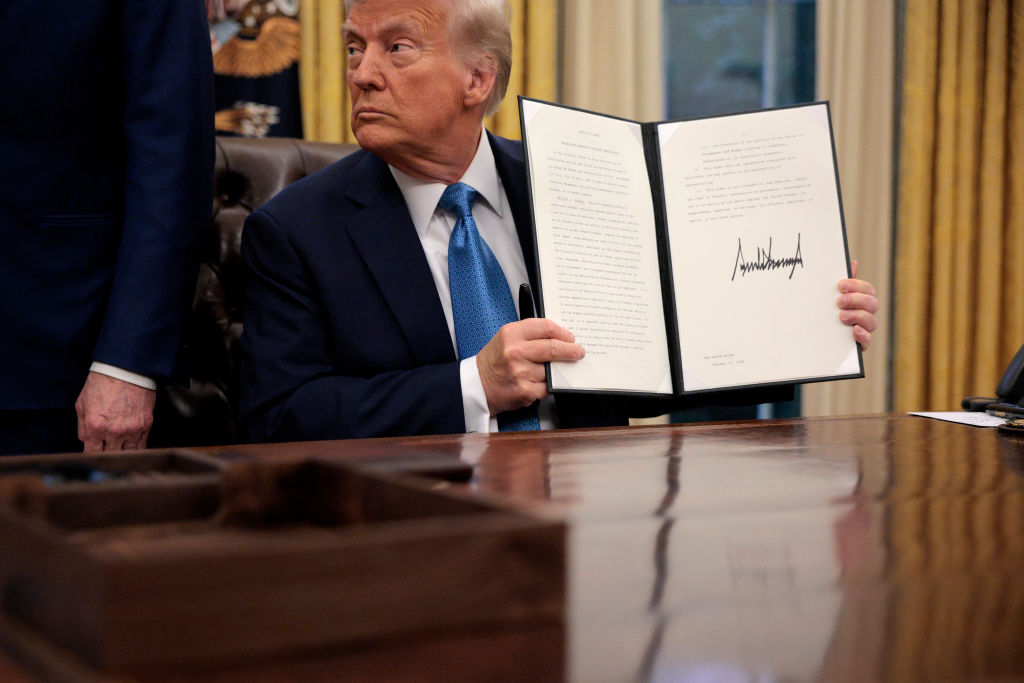In 2005 my seventh novel, about an unloving mother tortured by whether her son’s high-school mass murder was all her fault, designated me the go-to girl for commentary about school shootings. Consequently, the overweight, tremulous, flush-faced Jennifer Crumbley belongs to me. Known for arguably overloaded character names, I couldn’t have invented a better surname for an iconic Bad Mother. Hitting harmonics with “crummy” (lousy) and “crumby” (untidy), “Crumbley” also suggests unsoundness, dereliction and collapse.
In 2021, Jennifer’s son Ethan, then fifteen, killed four of his classmates and injured seven others at his Michigan high school with a handgun his father had bought him for Christmas. After pleading guilty to twenty-four charges, Ethan was sentenced to life without parole. Last week, his mother was convicted of involuntary manslaughter for her son’s four murders. Jennifer could face up to sixty years in prison without having pulled a trigger.
Why criminalize parents exclusively for school shootings? Shouldn’t they be jailed for their children’s robberies?
Nearly all fifty states have parental liability laws, but these are civic. Victims of minors who commit crimes can sue the children’s parents for financial redress, though most such laws put a hard numerical limit on the damages. So if your kid vandalizes your neighbor’s garden gnomes or gets in an accident driving your car, you may have to pay up. What makes the Crumbley case extraordinary is that the prosecution is holding the parents, who are being tried separately, criminally responsible for their son’s rampage. It’s one thing to be out of pocket, quite another to spend many years in prison when a jury decides you’ve been a crummy parent.
Outside the US, most find find it appalling that any parent would give a child access to a firearm, even for use at a shooting range, but the father’s purchase was legal, whether or not you think Americans have their heads up their backsides on this point. Many states, wisely, have laws mandating the secure storage of guns, but Michigan isn’t one of them.
The prosecution’s case rested primarily on the proposition that the parents should have detected the “warning signs” that their son was disturbed. The state quoted Ethan’s journal: “I have zero help for my mental problems and it’s causing me to shoot up the f-ing school” — though Jennifer claimed she never read his private journal, and her son had never asked for therapy. In texts to a friend, Ethan complained of paranoia, insomnia and hearing voices, but his mother never saw these texts before the court’s discovery process. Ethan’s text to his mother about having seen a “demon” sounds unsettling, but the family had an ongoing joke about their “house ghost.” Jennifer’s character was questioned. She conducted an extramarital affair. She spent too much time and money on her horses. Off with her head!
On the day of the shooting, Ethan drew a picture on a math exercise of a gun pointed down at a figure and wrote “the thoughts won’t stop help me” and “blood everywhere.” The school contacted the parents, who both came into the school. After their meeting with administrators, everyone seemed to agree that Ethan should spend the rest of the day in school. True, the parents never mentioned the existence of a handgun in the household. Fatally, no party thought to search Ethan’s backpack.
In hindsight, it’s not that hard to construct a sequence of clues that make such a melee seem inevitable, so much so that surely the parents should have seen it coming and headed it off. But hindsight is cheap. Without foreknowledge, expressions of distress can seem like bog-standard adolescent unhappiness, not serious mental illness. Attempts to stop what hasn’t happened yet readily go overboard. In the hysteria over the school shootings of the early 2000s, teachers became overzealous prosecutors of pre-crime, expelling students who displayed the slightest aberrant behavior — writing an angry poem, or pointing a chicken bone in the cafeteria and saying: “Bang, bang, bang.” It’s doubtful whether the jumpy hypersensitivity saved any lives.
Specifically to reduce school shootings, Jennifer’s prosecutor unabashedly aimed to send a message to parents more broadly. But if we’re criminalizing third parties here, liability should logically spread to principals, teachers and counselors. Desperate to pin this warped contemporary fad on adults, the press has blamed everyone from violent video game makers to the rock musician Marilyn Manson. Besides, why criminalize parents exclusively for school shootings? Shouldn’t they also be jailed for their children’s robberies and sexual assaults? Lest we deter every sane person of reproductive age from foolishly starting a family, let’s constrain criminal culpability to the culprit.
This flimsy case sets an ominous precedent whose real implications today’s law enforcement is unlikely to follow through on. The intrepid investigative journalist Heather Mac Donald beat me to this punch: school shootings represent a tiny fraction of the country’s homicides, the majority of which are committed by black people, just as the majority of the victims are black. If US jurisprudence were to truly come after negligent parents who don’t keep track of what their kids are up to, fail to protect the community from their children’s wayward impulses and don’t heed the subtle tell-tale “warning sign” such as running the streets in groups until 4 am with black-market assault weapons, prosecutors would have to charge the impoverished, often black parents of underage gangbangers in Chicago, LA and New York. Which will never happen.
The parents of child murderers are already punished. Conscientious parents are punished the most profoundly, left to rack their brains over what they did wrong and why they didn’t see the carnage coming. But children don’t arrive with a user’s manual. Parenthood is a crapshoot, and some kids, despite the sincerest efforts, don’t reward the risk. Had Michigan law allowed, a conviction for poorly securing a firearm might have been justified. But I listened to hours of Jennifer Crumbley’s testimony. She’s an ordinary woman with commonplace failings. Maybe she spent a bit too much time with her horses. That doesn’t mean she deserves sixty years.
This article was originally published in The Spectator’s UK magazine. Subscribe to the World edition here.


























Leave a Reply